This spring, the J-School is excited to welcome several alumni, Ph.D. students and emeritus faculty members to its team. These lecturers and adjunct instructors offer students unique perspectives in their courses since they have real-world experience in a variety of communications settings. Get to know the seven new faces joining the J-School teaching team and what they hope their students take away from their courses.
Kajsa Dalrymple
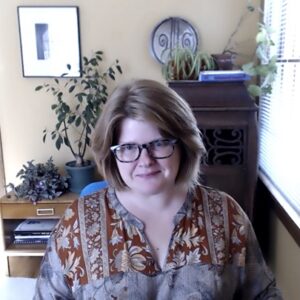 Kajsa Dalrymple joins the J-School as a lecturer and honorary fellow. She is the founder of Dalrymple Advising, LLC and a former associate professor at the University of Iowa School of Journalism and Mass Communication. She specializes in storytelling, media effects and environmental journalism and will teach JOURN 447: Science and Environmental Journalism this spring.
Kajsa Dalrymple joins the J-School as a lecturer and honorary fellow. She is the founder of Dalrymple Advising, LLC and a former associate professor at the University of Iowa School of Journalism and Mass Communication. She specializes in storytelling, media effects and environmental journalism and will teach JOURN 447: Science and Environmental Journalism this spring.
What made you want to come back to UW and teach in the J-School?
I am most at home in the classroom working with students. I was so excited to hear that the J-School was teaching Science and Environmental Journalism again as it is a class that was taught by two of my former mentors, Sharon Dunwoody and Deborah Blum. It’s an honor to help continue the work that they began at UW.
What perspective do you bring to the students you teach?
I love working with students to help them tell stories from their own communities. The best stories are those that value the source and connect back to a person’s community.
Matthew DeFour
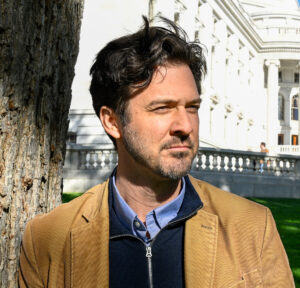
Matthew DeFour started in September 2022 as Wisconsin Watch’s first statehouse bureau chief. His team’s investigative journalism focuses on threats to Wisconsin’s democracy. Prior to Wisconsin Watch, DeFour spent 16 years covering state and local government for the Wisconsin State Journal and spent four years as the state politics editor. In 2020, he was honored as the 2020 Wisconsin Watchdog of the Year. DeFour will teach JOURN 420: Investigative Reporting.
What made you want to come back to UW and teach in the J-School?
Teaching has always been a career goal, having been mentored and inspired by past UW instructors Ron Seely, Andy Hall and, of course, Dee Hall. When Dee announced she was retiring from Wisconsin Watch last summer I jumped at the chance to teach her investigative reporting class. I’ve worked with Dee on some of my biggest investigations of Wisconsin state government, including a report that broke open problems at the Wisconsin Economic Development Corp. that went all the way up to Gov. Scott Walker’s administration.
What perspective do you bring to the students you teach?
I have almost 20 years of award-winning experience as a political and investigative reporter, having covered local government, K-12 education and state government as both a reporter and editor. I have a keen understanding of how Wisconsin state government works and a long list of sources. Student will have an opportunity to see their work that we produce this semester published by Wisconsin Watch and by our partner news organizations in print, radio, TV and online.
Max Fuller
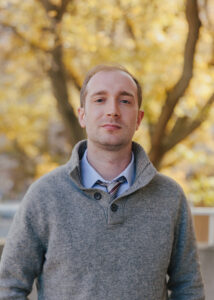 Max Fuller is a Ph.D. student in the J-School and his research focuses on the role of journalism in the construction of identity in early 20th century America. He has taught courses in multiple departments on campus including Communication Arts and English. Fuller will teach JOURN 150: Introduction to Sports Communication.
Max Fuller is a Ph.D. student in the J-School and his research focuses on the role of journalism in the construction of identity in early 20th century America. He has taught courses in multiple departments on campus including Communication Arts and English. Fuller will teach JOURN 150: Introduction to Sports Communication.
What made you want to teach in the J-School?
I’ve been a graduate instructor within the UW J-School for the last five years and thoroughly enjoy the students and the content. And sports communication is an incredibly fun and interesting topic to engage with on a daily basis.
What perspective do you bring to the students you teach?
I bring a particularly historical perspective to my students. My work focuses on 19th and 20th century American journalism and history so I strive to provide a uniquely historical context for students. I want students to understand how the subjects we work with fit within the broader tapestry of past and present American life.
Pat Hastings
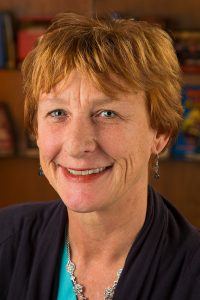 Pat Hastings is a distinguished lecturer and emeritus distinguished teaching faculty III member. She specializes in video and audio journalism and has worked in radio and TV news in Pittsburgh, Indianapolis, Milwaukee and Green Bay. She has also owned her own media consulting firm and is listed with producer credits in IMDb for work producing independent films. Hastings retired from the J-School in 2022 and is returning to teach JOURN 335: Principles and Practice of Reporting in which student will examine all styles of reporting and cover stories in the community and on campus.
Pat Hastings is a distinguished lecturer and emeritus distinguished teaching faculty III member. She specializes in video and audio journalism and has worked in radio and TV news in Pittsburgh, Indianapolis, Milwaukee and Green Bay. She has also owned her own media consulting firm and is listed with producer credits in IMDb for work producing independent films. Hastings retired from the J-School in 2022 and is returning to teach JOURN 335: Principles and Practice of Reporting in which student will examine all styles of reporting and cover stories in the community and on campus.
What made you want to come back to UW and teach at the J-School?
I am coming back to SJMC ( I retired a year and a half ago) because I missed the classroom collaboration and getting to know the students. It’s a great experience watching people polish their skills and then, suddenly, they are interning or getting jobs.
What perspective do you bring to the students you teach?
I bring to the J school different experiences from the field. I still work in video and audio, and that adds fresh perspective to the classroom. And I’ve been around the SJMC for a while, and I can help and guide students with professional connections and career decisions in news, whether its audio or video.
Jisoo Kim
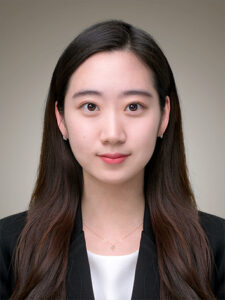 Jisoo Kim is a Ph.D. student and the Helen Firstbrook Franklin Wisconsin Distinguished Graduate Fellow at the J-School. Her research explores how media environments influence social democracy, with a particular focus on public perception and polarization. Kim is teaching JOURN 565: Effects of Mass Communication which covers various media effect theories such as priming, cultivation and framing. Her class will explore how these theories have been applied to empirical studies as well as the real-world effects of traditional and emerging media.
Jisoo Kim is a Ph.D. student and the Helen Firstbrook Franklin Wisconsin Distinguished Graduate Fellow at the J-School. Her research explores how media environments influence social democracy, with a particular focus on public perception and polarization. Kim is teaching JOURN 565: Effects of Mass Communication which covers various media effect theories such as priming, cultivation and framing. Her class will explore how these theories have been applied to empirical studies as well as the real-world effects of traditional and emerging media.
What made you want to teach at the J-School?
Since I joined the J-School, I’ve had great opportunities to learn how to inspire and interest students in so many intriguing topics surrounding our fields and how to engage with and mentor them as a TA. I always appreciated the time I spent with my students pursuing an academic journey with passion and curiosity. These were the moments I could introduce and share what I am so enthusiastic about doing research with others beyond texts and articles. Now, as an instructor, I enjoy further flexibility in choosing what to discuss and in what ways, along with a greater responsibility.
What perspective do you bring to the students you teach?
I am an Asian female graduate student from South Korea who loved storytelling as much as dreaming of being a screenplay writer at once and came to the US to study communications further, becoming a proud member of the J-School. My work, including research and teaching, would involve every aspect of me as such. In my research, I have delved into questions, such as how communications aggravate or mitigate political polarization, how mis- and disinformation is disseminated and addressed, and how people differentially process mass communication and shape their opinions and actions accordingly. I’ve dealt with diverse topics, including identities, immigration, health, nuclear diplomacy, politicization, etc. I bring the insights I’ve obtained from my research and lived experience, demonstrating the real, broad implications of the media effect research we are exploring together in this course.
Deb Medsker
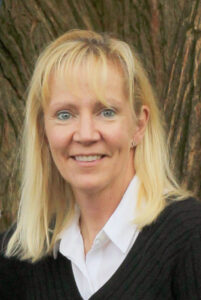 Deb Medsker joins the J-School as an adjunct instructor and brings more than 30 years of marketing and strategic communications experience to her role. She began her career at Leo Brunett, working on clients such as Kellogg Company, Coca-Cola Company, and Walt Disney Studios. Currently, Medsker serves as the senior vice president, director of global operations for Publicis Media. She is a proud J-School alum and has guest lectured in a variety of advertising classes in the past. She will teach JOURN: 447: Strategic Media Planning, a course she took as an undergraduate student and is now revamping the content to reflect the latest trends in how strategic messaging campaigns are delivered to their intended audiences.
Deb Medsker joins the J-School as an adjunct instructor and brings more than 30 years of marketing and strategic communications experience to her role. She began her career at Leo Brunett, working on clients such as Kellogg Company, Coca-Cola Company, and Walt Disney Studios. Currently, Medsker serves as the senior vice president, director of global operations for Publicis Media. She is a proud J-School alum and has guest lectured in a variety of advertising classes in the past. She will teach JOURN: 447: Strategic Media Planning, a course she took as an undergraduate student and is now revamping the content to reflect the latest trends in how strategic messaging campaigns are delivered to their intended audiences.
What made you want to come back to UW and teach in the J-School?
I used to guest-lecture during Dhavan Shah’s media classes when we did entry-level recruiting for Starcom at the UW each spring in the early 2000s, and I always enjoyed the opportunity to meet with students and share more about the career options available in the world of media. It felt nice being able to give something back to the university, and I’m pleased to be able to dedicate more of my time to that now and in the future.
What perspective do you bring to the students you teach?
So much has changed since I first studied advertising here and took my first job in the industry. At the time, network television was very much the focus on both the client side and the agency side; digital advertising wasn’t even an option. In those days, media tended to get short shrift during agency pitches; for many clients, media planning was really just an exercise in determining the right TV daypart mix, and no one really knew which specific element of the plan was driving sales (or failing to do so).
Now, though, media is at the forefront for most clients, and sophisticated media mix modeling and attribution studies are the norm. Effective creative assets are obviously still tremendously important—but media is an essential part of the conversation, much further upstream than it used to be. I like seeing how advances in measurement technology have helped shape the industry to where it is today—and I’ll enjoy discussing with students the new career opportunities these changes have opened up for them.
Yiming Wang
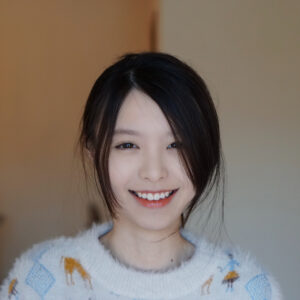 Yiming Wang is a Ph.D. student at the J-School and her research explores the nexus of political communication and intergroup dynamics. Specifically, she looks into the ways in which the evolving information landscape and social interactions shapt intergroup animosity, especially in terms of polarization and xenophobia. Wang is teaching JOURN 162: Mass Media in Multicultural America this spring.
Yiming Wang is a Ph.D. student at the J-School and her research explores the nexus of political communication and intergroup dynamics. Specifically, she looks into the ways in which the evolving information landscape and social interactions shapt intergroup animosity, especially in terms of polarization and xenophobia. Wang is teaching JOURN 162: Mass Media in Multicultural America this spring.
What made you want to teach in the J-School?
I am currently a doctoral candidate at SJMC. My decision to teach here was driven by my deep interest in interacting with fresh, inquisitive minds, which are central to America’s media life and ecology. It’s my way of sharing the valuable knowledge and insights I have gained here, contributing to the nurturing academic environment that has significantly influenced my own academic and professional development.
What perspective do you bring to the students you teach?
In my teaching, I bring a perspective deeply rooted in my research in media ecology and intergroup dynamics. My work delves into understanding how the evolving information landscape and social interactions influence intergroup animosity, with a particular focus on affective polarization and xenophobia. By integrating these insights into my curriculum, I aim to provide students with a comprehensive and nuanced understanding of these critical issues, preparing them to navigate and contribute to a rapidly changing media environment in the multicultural America with a well-informed and thoughtful approach.